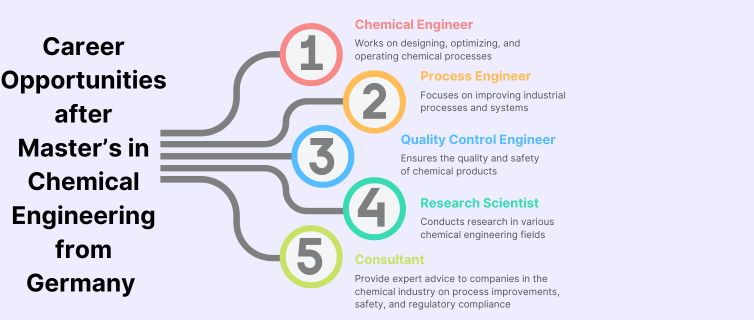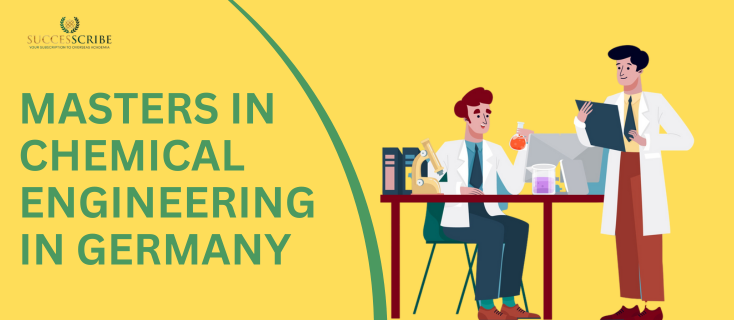Germany stands out as the Global Leader in Engineering Education. A master’s degree in chemical engineering in Germany is noteworthy because it gives students a comprehensive understanding of chemical processes. The Universities in Germany have remained among the best globally and continue to offer courses that induct theoretical knowledge with hands-on experience. Some of the Best Universities ranked among the top in the world are TU Munich, RWTH Aachen, KIT, and the University of Stuttgart.
Masters in Chemical Engineering in Germany usually is a 2-year ( 4 semesters) program.
Why Germany for Masters in Chemical Engineering?
Germany excels in engineering education with its innovative research, state-of-the-art facilities, and tight industry networking. Here are the reasons why there is no match for doing your Master’s in Chemical Engineering from Germany:
Germany is a hub for many of the world’s recognized universities that house award-winning programs in Chemical Engineering.
TUM, RWTH, and KIT are some examples.
- Germany is the perfect destination for students who wish to pursue a first-class education in Chemical Engineering; it combines rigorous academics with practical experience.
- The German universities are highly research and development-oriented, providing students with opportunities to work on projects that are almost pathbreaking in nature.
- The country’s strong tradition in chemical and engineering industries generates immense internship and job opportunities for graduates.
- Many programs are delivered in English, thus enabling students from other countries to study in the rich environment of psychology.
- Germany has high living standards, very good public transport, and a varied cultural life.
Requirements for Masters in Chemical Engineering in Germany
Here are the essential requirements to get enrolled in the MS in chemical engineering in Germany.
| Requirements | Details |
| Degree | Bachelor’s Degree in Chemical Engineering is a must requirement. Others may accept related engineering and natural science degrees. |
| Minimum GPA | A good academic record is essential. 75% is the minimum score to get enrolled in the program. |
| APS Certification | An APS certificate is often required, more so for students from India. This document certification confirms that your academic qualifications are equivalent to German standards, which is highly needed during most university applications in Germany. |
| Blocked Account | Evidence of sufficient means to cover your living expenses in Germany. Ordinarily, this amount, which is required to have a blocked account in Germany, would be around €11,208 yearly. |
| Language Requirements | For German Language Proficiency, Commonly Accepted tests include: TestDaF: Typically a B2 or C1 level. Goethe Certificate: C2 level DSH: DSH2 or higher. For English Language Proficiency, Accepted tests and minimum scores usually include: TOEFL: Minimum Score 80 – 100 IELTS: Minimum Score 6.5 band Duolingo: Acceptable for some universities, with varying score requirements. Minimum Score: 105-115. |
| Letter of Recommendations | Almost all programs require two or three recommendation letters. Most of them come from professors, although supervisors at work can also be ideal. |
| Statement of Purpose | A student needs to have a very strong statement of purpose. It needs to describe your background academically, research interests, and career targets. |
| Letter of Motivation | The motivation letter should be 300-500 words, clearly explaining one’s academic and career goals, relevant experience, and reasons for interest in the chosen program and university. Explain how your background and the skills acquired match the program’s strengths. |
Also Read: Masters in Architecture in Germany for Indian Students
Core Courses and Specialization
Masters in Chemical Engineering in Germany is a two-year program. Here are the core courses and specializations of the course. Students have the choice to select their electives based on their interests.

| Core Courses | Specialization |
| Chemical Reaction Engineering | Biochemical Engineering |
| Advanced Thermodynamics | Environmental Engineering |
| Transport Phenomena | Nanotechnology |
| Materials Science | Process Safety and Hazard Analysis |
| Thermodynamics |
Here is the Detailed information about the core course and specialization.
Core Courses
Thermodynamics: In-depth study of the principles of thermodynamics applied to chemical processes.
Chemical Reaction Engineering: Designing and Analyzing of chemical reactors.
Process Systems Engineering: Techniques and tools utilized in designing and optimizing chemical processes and systems.
Materials Science: The course is related to the principles underlying understanding materials’ properties. This includes the applications involved in the process of chemical engineering.
Transport Phenomena: Transport phenomena study the movement, i.e., heat, mass, and momentum involved in chemical processes.
Specialization
Biochemical Engineering: Applying chemical engineering principles to processing and manipulating biological and organic materials.
Environmental Engineering: The course concerns pollution control technologies and sustainable practices.
Nanotechnology: Nanomaterial as well as its use in applications in chemical engineering.
Process Safety and Hazard Analysis: Techniques in ensuring safety and reliability of chemical processes.
Scholarships for Masters in Chemical Engineering in Germany
Here are some scholarships individuals can get during their MS in chemical engineering in Germany. In this table, you’ll get to know the requirements needed and the minimum amount scholarships can give to the students.
| Scholarship Name | Requirement | Minimum Amount in (€) |
| DAAD Scholarship | Students with excellent academic records | €850 per month + travel and insurance support |
| Konrad-Adenauer-Stiftung (KAS)Scholarship | International students with a good result in previous studies, usually a minimum GPA of 2.5, and with leadership potential. Applicants should be politically or socially active or be heavily involved in political or social issues | €1,200 a month |
| Heinrich Böll Foundation Scholarship | International students with excellent academic records and committed to environmental or social concerns | €750 per month |
Also Read: Renewable Energy Masters Programs in Germany
Tuition Fees for Masters in Chemical Engineering
An overview of the approximate tuition fee per semester is as follows:
| University Type | Average Tuition Fee per Semester |
| Public Universities | €0 – €500 |
| Private Universities | €2800 – €12000 |
Public Universities: Most of the time, tuition fees are zero in public universities. Germany is known for its quality education at a meager cost. In Public Universities students need to pay for semester contribution, which is around 350 euros per semester.
Private Universities: In Private universities, tuition fees are typically higher than Public universities but the batch sizes in private universities are lower than the public universities. Semester Contribution in Private Universities is around €2800 – €12000.
Career Opportunities
Pursuing a Masters in Chemical Engineering in Germany can open doors for you to some of the leading and high-paying career opportunities in the market.
Here are some top career opportunities individuals can expect after completing their masters in Chemical Engineering from German Universities.
Chemical Engineer: Can engage in chemical process design and optimization, work on developing new materials, or increase manufacturing efficiency.
Process Engineer: Optimize industrial processes, guarantee safe and compliant work, and implement new technologies.
Research Scientist: Do research concerning material sciences, environmental engineering, or biotechnologies.
Quality Control Engineer: Evaluate the quality and safety of chemical products after being subjected to testing and analysis.
Consultant: Give professional advice to chemical companies to upgrade their processes, working environment, and operational activities as per statutory regulations.
Average Salaries
After Completing MS in Chemical Engineering in Germany. Graduates earn handsome salaries in Germany or other countries. Here are some of the top job roles with their average salary amount.
| Job Role | Average Salary Amount |
| Chemical Engineer | €55,000 – €75,000 |
| Process Engineer | €50,000 – €70,000 |
| Research Scientist | €55,000 – €70,000 |
| Consultant | €70,000 – €90,000 |
| Biochemist | €7,5000 – €95,000 |
Best Universities for Masters in Chemical Engineering in Germany
Germany has top-rated, world-ranking universities offering master’s in chemical engineering programs.
Here are some of the best universities you can pursue for your master’s in chemical engineering. In this table, you also get to know the specializations offered by the universities.
| University | Program Name | Specializations Offered |
| Technical University of Munich | Master of Science in Chemical Engineering | Process Engineering, Sustainable Chemistry, Biochemical Engineering. |
| RWTH Aachen University | Master of Science in Chemical Engineering | Chemical Process Engineering, Material Science, Catalysis. |
| Karlsruhe Institute of Technology (KIT) | Master of Science in Chemical Engineering | Process and Chemical Engineering, Sustainable Energy Systems. |
| University of Stuttgart | Master of Science in Chemical Engineering and Process Technology | Process Technology, Chemical Reaction Engineering. |
| Technical University of Berlin | Master of Science in Chemical Engineering | Chemical Engineering and Process Technology, Energy Systems. |
| Otto von Guericke University | Master of Science in Chemical Engineering | Chemical Process Engineering, Sustainable Chemical Processes. |
| University of Duisburg-Essen | Master of Science in Chemical Engineering | Chemical Process Engineering, Environmental Engineering |
| University of Erlangen-Nuremberg | Master of Science in Chemical Engineering | Chemical Process Engineering, Materials Engineering. |
| Ulm University | Master of Science in Chemical Engineering | Biochemical Engineering and Material Science |
| Leibniz University Hannover | Master of Science in Chemical Engineering | Chemical Reaction Engineering, Biochemical Engineering |
Conclusion
Doing your Masters in Chemical Engineering in Germany opens the way to high-quality education, cutting-edge research, and excellent career prospects. With highly ranked universities, some of the award-winning programs at German institutions have great industry ties that ensure a world-class environment for any interested student seeking further studies in chemical engineering. Doing your master’s in Germany offers top-notch research opportunities and a lively academic environment that is genuinely life-changing.
Related Post
Masters in Marketing in Germany
Automotive Engineering in Germany For Indian Students
Masters in Management in Germany
Supply Chain Management in Germany For Indian Students













